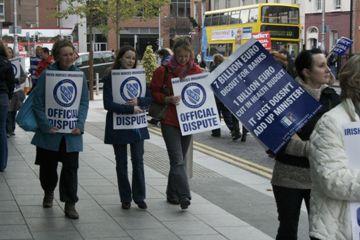4,500 Dublin hospital staff to strike on ‘outsourcing’

Siptu is planning a 48 hour all out strike action in seven Dublin hospitals on 7 April. At the centre of this industrial action is ‘outsourcing’. Outsourcing is the jargon used to describe the privatising of services which have been traditionally carried out by public sector workers. The workers involved in this action are ‘support staff grades’, i.e. anybody who does not do clinical care work in a hospital including porters, caterers, cleaners, security, care assistants and their supervisors. These are the lowest paid staff in the health service. This industrial action is in relation to the potential privatisation of these services and possible loss or down grading of these 4,500 jobs.
The action is led by SIPTU who represent 4,500 workers in what are known as the Dublin Area Teaching Hospitals (DATs). These are St. James, St. Vincents, Blanchardstown, the Mater, Beaumont, Tallaght and St. Colmcille’s hospitals. Nationally about 25,000 workers are in such roles.
There has been a trend internationally towards outsourcing or privatising of what are called ‘hotel facilities’ – catering, security, cleaning – as a way of cost cutting. In the last social partnership agreement, ‘Towards 2016', there was agreement into relation mechanisms for progressing change in the health services. These include the health forum, high end negotiations between unions and health service management as well as usual local industrial relations functions. There was no agreement between the HSE and unions on outsourcing when talks broke down in December so, in effect, at the moment there is no industrial relations infrastructure in place to address these areas of conflict.
The trigger for this action was that unions became aware of a document circulating around the DATs which related to a proposal by Zehnachar, a private consultancy firm and how services could be outsourced collectively for Dublin Teaching Hospitals. Interestingly this proposal was rejected by DATs on the basis of its cost and also the fact that it would have to go to a public tendering process.
All out strike action for 48 hours in all of Dublin’s main hospitals is gravely serious. If it goes ahead, it could bring hospitals to a standstill as a hospital can’t function without these people. Porters or attendants are needed to bring people to theatre and cleaners and sterilisers are essential to keep theatres and equipment clean. These workers are not at the high profile end of healthcare but nonetheless are essential for it to function.
Also, while it may be cheaper in the short-term to outsource, there is significant evidence that this is not the case in the long term. For example, a permanent public sector cleaner is paid €13.50 an hour in the Mater, if it were to be contracted out to a private contract cleaning firm the pay is €9.50 an hour so there is no value for money argument there. However, there is also a body of literature which shows that cleaning staff who are salaried full time employees provide a better service. They are in the hospital day in day out, the hospital is often in their community, they have a relationship with the staff and often the patients. Full time salaried employees could actually be cheaper in the long term in terms of savings that are made by preventing long term infections.
Gerry Robinson in his programme ‘How to save the NHS’ recommended cleaning staff being part of the core hospital staff and therefore part of the team, and not just contracted in and out, as it would be more beneficial to the running of the hospital.
Beside the article by Martin Wall on this issue in the Irish Times last week, there is also an article by Eithne Donnellan how these same hospitals have endured budget cuts of €160 million. So they are expected to provide more services to more people with less money, and under pressure to find ’savings’. Some services in some Dublin hospitals are already outsourced and while the DATs are saying they are not outsourcing collectively, they say the hospitals will continue to consider it individually as a mechanism to save money.
The HSE say they are looking to measure and streamline what’s going on in support services and ‘hotel facilities’ and have outsourced a data gathering exercise for this purpose. The unions are worried that this is the thin end of the wedge and outsourcing is being pursued by the HSE nationally as well. For example, in the context of the staff moratorium, there are examples in clinical care of staff coming back from a year’s leave and are not being rehired, instead they are coming back to do the same job as an agency worker – that way the HSE has to pay more for same person to do the same job but the worker has none of the rights or security of a public sector job.
This dispute is all happening in the context of the unions ‘talks about talks’ with government last week. Kieran Mulvey of the Labour Relations Commission has asked for no escalation of industrial relations action. Siptu says this action is part of broader public sector action in relation to pay cuts. Since the government walked out of pay talks, there is no industrial relations procedure in place to tackle the standoff.
It would seem there is a lot of misinformation and no communication going on. If only the parties involved would engage with one another, there would be some hope of reaching agreement and preventing a damaging all-out strike for two days early next month.
